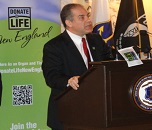Scientific Program

Reza Saidi
State University of New York Upstate Medical University, USA
Title: Utilization of expanded criteria donors in liver transplantation
Biography:
Reza Saidi earned his medical degree at Tehran University of Medical Sciences in Iran in 1997. He moved to US in 1999 and since then has remarkable achievements. Before joining UMass as Assistant Professor of Surgery, Dr. Saidi did a 3 year clinical and research fellowship at Massachusetts General Hospital, Harvard Medical School. He has made outstanding contributions to the field of transplantation. His unique work on tolerance is outstanding because it touches upon critical issues while developing a unique and novel framework (elaborate). As a result, Dr. Saidi has been published more that 60 abstracts, papers and book chapters. Dr. Saidi has continuously distinguished himself for his scholarly work. This is evidenced by his publication record and multiple prestigious award such 2009 ASTS Vanguard award for the best paper published by a junior member and Ruth L. Kischstein National Research Service Award to mention a few.
Abstract
Utilization of expanded criteria donors in liver transplantation Improvements in surgical techniques, immunosuppression, and post-transplantation patient care have led to the optimization of liver transplantation outcomes. However, the waiting list for liver transplantation is increasing at a greater pace. The large gap between the growing pool of patients waiting for liver transplantation and the scarcity of donor organs has fueled efforts to maximize existing donors and identify new sources. This article will be focused on the current state of liver transplantation using grafts from extended criteria donors (elderly donors, steatotic donors, donors with malignancies, donors with viral hepatitis) and from donation after cardiac death (DCD), as well as the use of partial grafts (split grafts and living-donor liver transplantation) and other suboptimal donors (donors with hypernatremia, infections, hypotension and inotropic support). Overall, broadened criteria for acceptable donor livers appear to lessen graft survival rates somewhat compared with rates for standard criteria organs.
- Organ Transplantation
- Transplantation Immunology
- Experimental Transplantation
- Barriers to Transplantation
- Organ Donation
- Pharmacology and Immunosuppression

